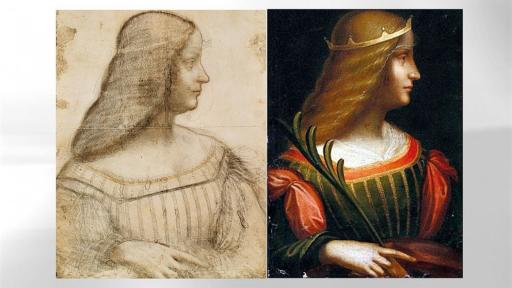
culled :yahoo news
A long sought-after artwork attributed to Leonardo da Vinci has been discovered among a private collection of 400 paintings locked in a Swiss Bank Vault.
The painting closely resembles a 1499 pencil sketch of Isabella d'Este, an Italian noblewoman, drawn by da Vinci in Mantua in Italy's Lombardy region, which is currently hanging in the Louvre Museum in Paris.
But as the great artist once said himself: "Art is never finished, only abandoned," and so it is only fitting that he should have returned to the sketch and reproduce it as a rich color portrait, as the Marquise had requested of him on numerous occasions.
Experts are claiming that the painting is a bona fide da Vinci. If proven, its discovery could herald an end to long scholarly speculation that the artist simply lost interest or ran out of time before finishing the project.
"There are no doubts that the portrait is the work of Leonardo," Carlos Pedretti, a professor emeritus of art history professor and expert in Leonardo studies at the University of California Los Angeles, told Italian newspaper Corriere della Sera.
"I can immediately recognise Da Vinci's handiwork, particularly in the woman's face," he told the newspaper.
Scientific tests seem to back up Pedretti's claims.
Carbon dating conducted in a laboratory at the University of Arizona confirmed with 95 percent accuracy that the artwork was painted sometime between 1460 and 1650, placing the artwork firmly within the time frame in which the artist is believed to have first met and sketched the aristocrat, who was one of the most influential women of her time.
Further testing indicated the paint pigments and primer used in the portrait also match the ones used by da Vinci throughout his career.
But Pedretti said that even after three and a half years of study following the painting's first revelation, more time was needed to determine which parts of the work, if any, may have been painted by da Vinci's students.
Not all experts are convinced that the 24-by-18-inch artwork discovered in the possession of an unnamed Italian family is an original work by the master painter.
One notable criticism is that the artwork was painted on canvas, as opposed to wooden panels, which were favored by da Vinci.
"Canvas was not used by Leonardo or anyone in his production line," Martin Kemp, professor emeritus of the history of art at Oxford University, told The Daily Telegraph. "Although with Leonardo, the one thing I have learnt is never to be surprised."
Last year another purported da Vinci masterpiece potentially worth more than $150 million was unveiled after it had sat in a Scottish farmhouse for nearly 50 years. At that time, critics also disputed the authenticity of the 500-year-old artwork depicting Madonna and her baby.
A similar discovery of what appears to be a younger version of the Mona Lisa in a Swiss Vault a month later was also refuted to be an original da Vinci, because, like the newest discovery, it too was painted on canvas rather than wood.
The "Mona Lisa" is among only 15 to 20 artworks around the world that have so far been and properly attributed to da Vinci.



0 comments:
Post a Comment